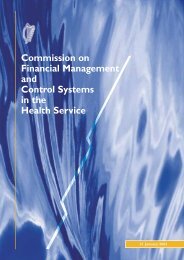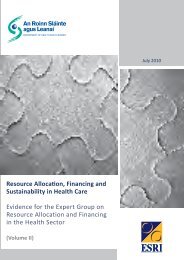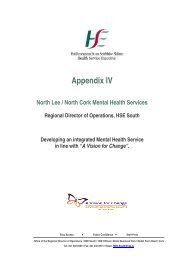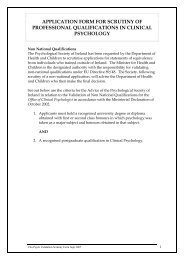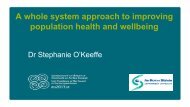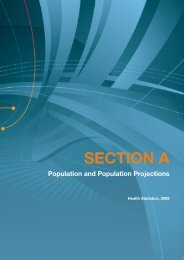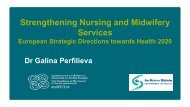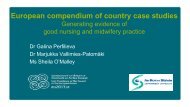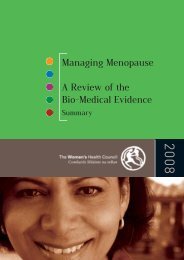All Ireland Traveller Health Study Our Geels - Department of Health ...
All Ireland Traveller Health Study Our Geels - Department of Health ...
All Ireland Traveller Health Study Our Geels - Department of Health ...
Create successful ePaper yourself
Turn your PDF publications into a flip-book with our unique Google optimized e-Paper software.
<strong>Health</strong> Survey Findings<br />
Northern <strong>Ireland</strong><br />
Similar challenges for <strong>Traveller</strong>s in terms <strong>of</strong> premature mortality have been noted in NI as in ROI.<br />
According to ‘Investing for <strong>Health</strong>’ (<strong>Department</strong> <strong>of</strong> <strong>Health</strong>, Social Services and Public Safety, 2002),<br />
<strong>Traveller</strong>s die about 15 years earlier than the general population in NI. Only 1 in 10 <strong>of</strong> the <strong>Traveller</strong><br />
Population is over 40 years <strong>of</strong> age and 1 in 100 is over 65. Child mortality up to age 10 has been found<br />
to be 10 times that <strong>of</strong> the population as a whole.<br />
The Royal Hospitals Group in Belfast commissioned research (McMahon, 2005) into a health assessment<br />
and needs <strong>of</strong> <strong>Traveller</strong>s in Belfast. The DHSSPS also supports a community health project with An Munia<br />
Tober in Belfast. In 1999 a new ‘Targeting Social Needs’ policy initiative in Northern <strong>Ireland</strong> contained<br />
a specific theme <strong>of</strong> PSI, and a PSI Working Group on <strong>Traveller</strong>s was created. In 2000 an initial PSI<br />
report was published (Office <strong>of</strong> the First Minister and the Deputy First Minister, 2000). The Executive in<br />
Northern <strong>Ireland</strong> produced a response to the PSI Working Group on <strong>Health</strong> in 2002 (Office <strong>of</strong> the First<br />
Minister and the Deputy First Minister, 2002), which contained a number <strong>of</strong> recommendations aimed at<br />
improving the health and wellbeing <strong>of</strong> <strong>Traveller</strong>s.<br />
Why Primary <strong>Health</strong> Care?<br />
Primary <strong>Health</strong> Care has been used as an innovative approach to health care in the developing world. In<br />
the last decade there has been a growing interest in and demand for these services, as evidence grows<br />
that marginalised populations suffer disproportionately from poor health and have less access to health<br />
care services.<br />
The concept <strong>of</strong> Primary <strong>Health</strong> Care was established at the joint WHO/UNICEF conference in Alma-Ata<br />
in 1978. It acknowledged the need to reform the conventional health systems. <strong>Health</strong> was seen as the<br />
concern <strong>of</strong> society as a whole.<br />
‘Primary <strong>Health</strong> Care (PHC) is essential health care based on practical, scientifically sound and socially<br />
acceptable methods and technology made universally accessible to individuals and families in the<br />
community, through their full participation and at a cost that the community and the country can afford to<br />
maintain at every stage <strong>of</strong> their development in the spirit <strong>of</strong> self-reliance and self-determination. It is the first<br />
level <strong>of</strong> contact <strong>of</strong> individuals, the family and community with the national system, bringing health care as<br />
close as possible to where people live and work, and constitutes the first element <strong>of</strong> a continuing health care<br />
process’<br />
Alma Ata Declaration 1978<br />
Primary <strong>Health</strong> Care is a statement <strong>of</strong> health philosophy, not a package, or a complete defined<br />
methodology. It is a flexible system that can be adapted to the health problems, culture, way <strong>of</strong> life<br />
and the stage <strong>of</strong> development reached by the community. Primary <strong>Health</strong> Care in communities means<br />
enabling individuals and organisations to improve health through informed health care, self-help and<br />
mutual aid. It encourages and supports local initiatives for health.<br />
23



